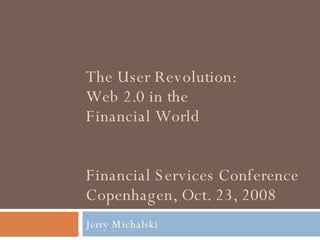Social Media in Financial Services
- 1. The User Revolution: Web 2.0 in the Financial World Financial Services Conference Copenhagen, Oct. 23, 2008 Jerry Michalski
- 2. WhoŌĆÖs speaking 1987-1998 as a technology industry analyst Avocation ’āĀ vocation Identifying trends Bridging business, society and tech Famous boss (Esther Dyson) 1998-now: independent consultant ŌĆ£ Guide to the relationship economyŌĆØ Raised in Peru and Argentina Champion for ordinary people
- 3. Signs of the times
- 4. Agenda User revolution Web 2.0 The big picture Effects on financial services
- 5. Important context The dominant worldwide platform: mobiles Today: Calls, SMS, Web Remittances ( G-Cash ) Pictures, video Soon: Your bank Your companion Much more (sensors)
- 6. Start: virtual flying hobby Not consumers User revolution
- 7. ╠²
- 8. ╠²
- 9. VATSIM
- 10. ╠²
- 16. New power for collective action Here Comes Everybody , by Clay Shirky c
- 17. Alternatives to ŌĆ£ConsumerŌĆØ Person Individual Player Family Seller Buyer Household Participant Viewer Fan Customer Client Citizen Member Co-producer Shareholder Stockholder Stakeholder User
- 18. New tools New attitude Web 2.0
- 19. Social mediaŌĆÖs many faces Blogs Microblogs ( Twitter ) Wikis Media sharing ( Flickr , YouTube ) Social search (Digg) Social networks (Facebook/ feeds ) Event calendars Lifestreaming ( FriendFeed ) MMOGs (WoW, SL ) Mashups ( HousingMaps.com ) Ratings (everywhere) Metadata Tagclouds Visualizations Analytics
- 20. ŌĆ£ Architecture for participationŌĆØ OpenStreetMap.org PatientsLikeMe.com Wikipedia IntuitŌĆÖs TaxAlmanac Wesabe
- 21. The big picture
- 22. Not just a technology shift Costs have plummeted (Natural Cost)
- 23. Natural Cost So much can be done for so little.
- 24. Not just a technology shift Costs have plummeted (Natural Cost) Power has shifted Let go of control Assume good behavior Let community fix bad behavior Emphasis on Social Open
- 25. Persistence
- 26. Exhaust data
- 27. Weaving a global brain
- 28. Effects on financial services
- 29. Differentiation People behave differently Expectations Preferences More info vs. less Interact often vs. seldom Aspirations & goals Connecting authentically
- 30. Implications Persistence + connectivity Abundance vs. scarcity Commercial v. gift economy Openness and transparency Trust(worthiness) From ŌĆ£consumerŌĆØ to co-creator Collective action Authentic participation
- 31. Alternatives to money Local currencies ( LETS ) Barter Peer-to-peer lending ( Prosper ) Coupon/gift card exchanges In-game currencies Reputation points Frequent-flyer miles Airtime minutes
- 32. Jerry Michalski [email_address] www.sociate.com +1 (415) 465-0256 Questions?
































![Jerry Michalski [email_address] www.sociate.com +1 (415) 465-0256 Questions?](https://image.slidesharecdn.com/michalski-0810-copenhagen-keynote-1224773031410612-8/85/Social-Media-in-Financial-Services-32-320.jpg)